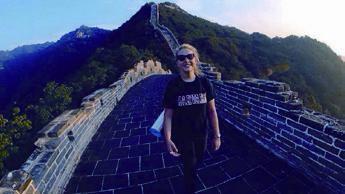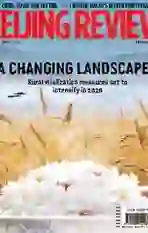Fantasy and Reality
2020-01-07ByNatashaLock
By Natasha Lock

‘When it comes to China, you can nev- er know enough.” These were the words inscribed on the fi rst page of the book, Law and Society in Traditional China, given to me by a fellow student, Tan Bo-Chen, on day one of my year at Peking University back in September 2016.
Over the past few years, I have slowly come to understand the depth of meaning in this phrase about such a culturally unique and historically great civilization. The more time I spend in China, and indeed the more I know about China, the less I seem to comprehend it. This country is absolutely fascinating: There is a mismatch between past and present; tradition and modernity; fast pace and slow pace; cities and mountains.
To be able to learn more about China and try to further understand it provides me with daily excitement. Starting each day with a walk around Peking Universitys beautiful Weiming Lake allows me to think about all the complexities, traditions and facets that construct this country.
I am 23 and from the UK. I am a graduate student at the Yenching Academy of Peking University. I have been extremely lucky to have spent the past six years back and forth from China traveling, working and studying. The most memorable periods have involved spending a year as an exchange student in Beijing, traveling to Tibet Autonomous Region in southwest China, working for a manufacturing company in Guangdong Province in south China, teaching 16-year-olds in Suzhou, Jiangsu Province in the east, for seven months and living in a Buddhist monastery hidden in the mountains of Zhejiang Province in east China.
Each experience has given me different stories, friendships, memories and challenges. Nevertheless, the constant here seems to be the stream of energy that flows through the country, and is totally different from any other place I have been to before. To detail the incredible hospitality, helpfulness and warmth I have encountered from people during my time here would take up the whole article. It is a true credit to the country.
As a graduate student at Peking University, my research interests surround Chinas changing position on the international stage, Chinas modern relationship with the past, and contemporary nationalism. The Yenching Academy allows for an interdisciplinary studies program, so my modules are anything from international relations to art and literature. I have found studying within China and from a Chinese perspective to be absolutely fascinating.
Furthermore, studying this subject in a country so essential to todays global politics is a unique privilege. The global system is undergoing a tectonic shift in which we can see the advance of the East with the slumping of Western states. We are seeing the stall of the U.S. corresponding with the rise of China.
For as long as I can remember, the East has fascinated me. My parents came to China back in the 1980s, and I grew up hearing stories of a city called Beijing swarmed with bicycles, the magnificent Terracotta Army in Xian, west Chinas Shaanxi Province, and an overall culture so different from the UKs.
China to me is a metaphorical Great Wall. Every aspect of China is designed to be preserved and like the origins of the Great Wall, to keep barbarians out. The language, the customs, the food, the traditions, the practices and the philosophies are so foreign to a non-native that it is almost easier to turn back around to your homeland than to even envisage a route to crossing the wall.
For the few that accept the challenge, China offers an incredible adventure. It was this concept that sparked my initial interest and kept me coming back, for I felt like I had unlocked a new world. From the bamboo rafts down the Lijiang River in the Guangxi Zhuang Autonomous Region, the deserts of Inner Mongolia Autonomous Region, to standing atop the base camp of Mount Qomolangma on the Chinese side, I am endlessly shocked by the variety of places to explore.
Living here provides for an unparalleled opportunity to practice Chinese, hear narratives from the East and conceptualize politics as it unfolds before us. The taxi driver reciting Confucius, the squat toilets, the wholesome couples dancing in public parks, the families wearing entirely matching outfi ts and the sweet sound of the pipa, the Chinese lute… this is China.
And this is the China that keeps drawing me back.
